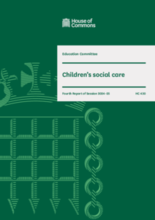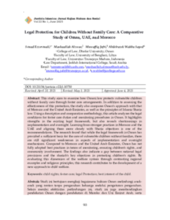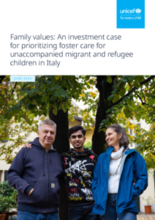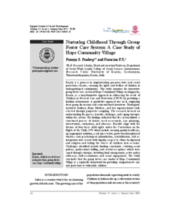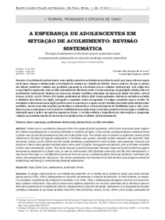Displaying 21 - 30 of 2221
This consensus statement on youth in foster care makes a case for a developmentally informed system of care. Although it avoids making specific policy and practice recommendations, it identifies general areas where research can inform change.
This study explores the experiences and challenges of caregivers providing trauma-informed care to foster children in a South African care facility. Findings highlight the emotional and practical difficulties faced by caregivers and emphasize the need for targeted training and support to strengthen their capacity and well-being.
This report makes a series of recommendations on issues affecting all types of care, including foster care, adoption, kinship care, children’s homes, and support for disabled children in the UK.
This position paper examines how stigma shapes reproductive health, poverty alleviation, and child welfare, influencing policy, service provision, and lived experiences. It argues that stigma is a structural barrier that worsens inequalities and calls for a cross-sectoral, lived experience–informed approach to reduce exclusion and improve outcomes.
This study analyzes how Omani law protects vulnerable children without family care through foster arrangements, comparing it with practices in Morocco, the UAE, and the principles of Islamic Sharia law. While Oman’s legal framework provides a foundation for care, the research highlights weaknesses in implementation and oversight, recommending stronger monitoring, greater community involvement, and closer alignment with both regional best practices and Sharia objectives.
Migrant and refugee children arriving in Italy often face significant trauma, having fled war, violence, and exploitation, and survived one of the world’s most dangerous migration routes across the central Mediterranean. UNICEF’s Terreferme project has shown that foster care placements cost municipalities significantly less than residential facilities, with the added benefit of strengthening the social service workforce through training and case management.
This study examines the group foster care model at Hope Community Village in Kerala, India as an innovative, family-based approach to supporting children in need of care and protection. Findings show the model delivers rights-based, comprehensive care aligned with the Convention on the Rights of the Child, while highlighting challenges related to funding, policy, staffing, and social acceptance, and demonstrating its potential as a replicable framework for child protection.
O acolhimento institucional é uma medida protetiva no âmbito da assistência social, que busca oferecer apoio social para crianças e adolescentes em situação de ameaça ou violação de direitos.
Providing comprehensive healthcare to children in foster care can be challenging. This discussion provides healthcare providers in the US with a practical, trauma-informed guide to caring for youth in foster care rooted in evidence-based practice and current guidelines.
This article investigates the image of an ideal foster grandparent as constructed by social workers, drawing upon 24 in-depth interviews with practitioners from foster care agencies in the Czech Republic.


